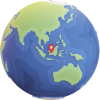Case studies are organised by region, with each region featuring links to the countries where the case studies are located.
Côte d'Ivoire

Côte d’Ivoire, the world’s top cocoa producer, is experiencing devastating deforestation driven by its principal economic activity, cocoa farming. Farmers typically rely on the natural soil fertility of virgin forests for high cocoa yields, leading to forests being cleared for cocoa cultivation. After five to ten years, when soil fertility dwindles, farmers move to the next fresh two to three acres of virgin forest to plant a new crop. This practice has led to a fourfold increase in deforestation in Saamaka lands and the growth of towns and villages in protected forest areas. To diversify and increase their income, some farmers make profitable deals with logging companies and illegal timber traders to remove trees to make way for cocoa crops. This practice has proved more lucrative for farmers than cocoa bean production, making illegal logging arguably one of the country’s most prevalent and lucrative forms of organised crime.
Keywords: Sub-Saharan Africa, Cote d’Ivoire, cocoa, primary production, deforestation, illegal timber trade, illegal logging, organised crime
Source: https://issafrica.org/iss-today/shady-cocoa-farming-at-the-root-of-cote-divoires-deforestation

According to Reuters, in May 2024, the Ivory Coast's Coffee and Cocoa Council (CCC) suspended around 40 cooperatives. These cooperatives were accused of hoarding cocoa beans with the intention of selling them at inflated prices, amidst a national supply shortage caused by adverse weather conditions and the spread of cocoa diseases. It is reported that these cooperatives and some independent buyers had stockpiled over 60,000 metric tons of cocoa since the mid-crop season began. This practice, though not illegal in itself, became problematic when it was used to drive up prices unfairly. While the official farmgate price was set at 1,500 CFA francs ($2.50) per kilogram, some cooperatives were demanding between 1,600 and 1,800 CFA francs at the ports of Abidjan and San Pedro. In response to these practices, the CCC suspended the trading activities of the implicated cooperatives and buyers, in order to stabilise the domestic market and prevent smaller exporters from being outcompeted by larger multinational companies willing to pay higher prices. While the CCC’s actions were largely supported by exporters, Reuters reports that the situation revealed underlying tensions within the cocoa supply chain.
Keywords: Sub-Saharan Africa, Côte d'Ivoire, cocoa
Sources: https://www.reuters.com/world/africa/ivory-coasts-cocoa-regulator-suspends-cooperatives-hoarding-beans-sources-say-2024-05-17/

Ivory Coast’s market regulator, under the leadership of Yves Brahima Kone, is planning to introduce measures to curb fraud related to fair-trade certified cocoa contracts. The Coffee and Cocoa Council (CCC) suspended sales of fair-trade certified contracts after recording an exponential increase in certified cocoa. Buyers and co-operatives have been using this program to push multinational companies into overpaying. To combat fraudulent contracts, the regulator is considering limiting the number of cocoa buyers to 30 from over a thousand. Next year, Ivory Coast will introduce a new certification and traceability system to align with European regulations on the import of commodities linked to deforestation.
Keywords: Sub-Saharan Africa, Côte d'Ivoire, cocoa, fairtrade fraud, deforestation
Source: Ivory Coast's regulator weighs options against fraudulent cocoa certification (timeslive.co.za)
Democratic Republic of the Congo

In 2021, the Democratic Republic of Congo’s (DRC) Tshopo province lost 12,000 hectares of intact forests to fires, a record-breaking loss linked to the expanding cultivation of cacao by recent migrants from neighbouring North Kivu province. This influx of people is caused by mass displacement of people from the South and North Kivu provinces in 2019 and 2020, which is, as a result, fuelling greater demand for food crops and an increase in cash crop production, especially cacao.
Some newcomers are financially well-off and able to purchase land from local chiefs to establish plantations, replacing forested areas. This has sparked tensions within local communities as land is considered communal property in many parts of Tshopo.
Cacao production, a well-documented driver of deforestation in West Africa, is now impacting the DRC. Efforts are being made to improve cultivators’ incomes to tackle child labour and prevent further deforestation. However, the specific dynamics in the DRC present unique challenges that need to be addressed.
Keywords: Sub-Saharan Africa, The Democratic Republic of Congo (DRC), cocoa, child labour, land grabbing, deforestation
Source: https://news.mongabay.com/2022/02/drcs-cacao-boom-leaves-a-bitter-aftertaste-for-congo-basin-forest/#:~:text=DRC's%20cacao%20boom%20leaves%20a%20bitter%20aftertaste%20for%20Congo%20Basin%20forest,-by%20Malavika%20Vyawahare&text=The%20DRC's%20Tshopo%20province%20lost,DRC%20move%20into%20the%20province
Ghana


A dramatic increase of illegal mining taking over cocoa production farms in Ghana has led to a shortage of cocoa beans, going as far as creating the near shutdown of processing plants throughout the nation. Although the cocoa bean shortage is also a result of climate change and the saturation of available farming land, the increased pressure on cocoa farmers to sell or lease their lands to illegal miners has further threatened the supply of cocoa. This process is locally known as galamsey. Investors will claim underlying gold deposits, influencing farmers to sell or lease their lands in exchange for financial compensation. Miners will then promptly exploit the area, making it impossible to reverse the damage caused. The galamsey operations are largely unregulated and illegal. They involve sophisticated equipment and harmful chemicals which pose severe environmental and health related risks. Once these mining activities have been completed, these methods make the quality of the land unsuitable for cocoa cultivation. Ghana, historically known for both cocoa and gold, has recently struggled with balancing both economic interests, and the need to preserve environmental and safety concerns in the face of small-scale mining.
Keywords: Sub-Saharan Africa, Ghana, cocoa, minerals, primary production, illegal mining, land grabbing
Source: https://www.ucl.ac.uk/news/2024/mar/analysis-cocoa-beans-short-supply-what-means-farmers-businesses-chocolate-lovers
https://www.nationalgeographic.com/science/article/ghana-gold-mining-cocoa-environment

The Cadbury brand, owned by Mondelēz International, is facing allegations of child labour on cocoa farms in Ghana. In April 2022, a Channel 4 Dispatches documentary revealed that children as young as 10 were using machetes to harvest cocoa pods, with some working long hours and not attending school. This comes despite the chocolate industry's 20-year-old pledge to eliminate child labour. In the documentary, children can be seen performing hazardous tasks without protective gear. One girl reported a severe injury from using a machete. However, Ghanaian law prohibits children under 13 from working on cocoa farms and bans hazardous labour for anyone under 18. Despite this, such issues are not contained to Mondelēz farms, with a 2020 study finding that 1.56 million children are involved in cocoa farming in Ghana and Côte d’Ivoire. Behind this child labour is cocoa farmers' poverty, with farmers earning too little to hire adult workers.
Keywords: Sub-Saharn Africa, Ghana, cocoa, primary production, labour rights violations, child labour
Sources: https://www.business-humanrights.org/en/latest-news/ghana-documentary-finds-child-labour-on-cocoa-farms-supplying-cadbury-owner-mondel%C4%93z-international/
https://www.theguardian.com/law/2022/apr/03/cadbury-faces-fresh-accusations-of-child-labour-on-cocoa-farms-in-
Liberia

Widespread cocoa-driven clearance of forests in the Ivory Coast has led to farmers in the country moving across the border into neighbouring Liberia to create new cocoa plantations. Long one of the world’s leading cocoa producers, Ivory Coast faces challenges such as ageing tree stocks and climate change that has led to declining production in the country. While farmers are leasing the land for these new plantations from Liberian landowners, the cocoa is being illegally trafficked back into the Ivory Coast and mixed in with Ivorian cocoa. This makes it exceedingly difficult to identify and trace source of cocoa being exported from the Ivory Coast, which could then violate environmental protection laws such as the European Union’s regulation on deforestation free products.
Keywords: Sub-Saharan Africa, Liberia, cocoa, primary production, smuggling, deforestation
Source: https://www.reuters.com/business/environment/cocoa-farming-liberia-risks-undermining-eu-deforestation-law-2024-04-22/
Nigeria

According to AP News, illegal logging activities in Nigeria's Omo Forest Reserve are increasing rapidly as a consequence of corruption and lax enforcement of environmental regulations. The Omo Forest Reserve is a protected area, but with timber in the outer, legally logged regions becoming scarce, loggers are encroaching deeper into the conservation zone. Issues such as uncontrolled cocoa farming and increased poaching are behind this illegal expansion. Illegal logging in the region is facilitated by rampant corruption and bribery. Loggers frequently bypass regulations by paying off government officials. Rangers report seeing previously arrested individuals back in the forest, demonstrating a widespread ability to avoid punishment. Forest guards also note that higher authorities override their attempts to prevent illegal logging, making them feel helpless. Illustrative of this corrupt behaviour, the Ogun state government, which owns the reserve, claims it is replanting more trees than are being cut, a claim that has been widely debunked. Such lax enforcement is caused by a local economic dependency on timber logging, which makes strict enforcement politically challenging.
Keywords: Sub-Saharan Africa, Nigeria, timber, cocoa, primary production, illegal logging, corruption and bribery
Sources: https://apnews.com/article/deforestation-logging-nigeria-climate-49513339cd47629b7413ae4788d61a3a

The article titled “Cocoa and gunshots: The struggle to save a threatened forest in Nigeria” published on Mongabay, discusses the struggle to save Nigeria’s Omo Forest Reserve from deforestation caused primarily by cocoa farming. The reserve, which provides habitat for animals such as forest elephants and drinking water for Lagos, has lost more than 7% of its tree cover over the past two decades. Thousands of small farmers, seeking fertile soil and a respite from poverty, have illegally settled in the reserve. The government is hesitant to evict them as it would disrupt their livelihoods and require significant funding. Instead, the focus is on preventing more farmers from invading Omo. This is the goal of rangers who patrol Omo’s remaining forests looking for footprints and listening for chainsaws and gunshots. Despite their efforts, the reserve is too big for the relatively small team to effectively monitor in its entirety.
Keywords: Sub-Saharan Africa, Nigeria, cocoa, primary production, illegal logging, illegal production
Source: https://news.mongabay.com/2019/07/cocoa-and-gunshots-the-struggle-to-save-a-threatened-forest-in-nigeria/
Peru

According to Mongabay, concerns were raised amongst prosecutors and environmentalists as a Peruvian court overturned a prior ruling. Indeed, in December 2020, a Peruvian court overturned a previous judgement against employees of the cacao company Tamshi SAC, absolving them of crimes related to illegal deforestation in the Amazon. This decision followed a significant lobbying effort by the company, but could lead to dramatic negative impacts in terms of combating deforestation. Tamshi SAC, formerly Cacao del Perú Norte SAC, cleared nearly 2,000 hectares of primary rainforest without proper permits and was fined 129 million soles by Peru’s Environmental Assessment and Enforcement Agency (OEFA). The company's officials, previously sentenced for illegal timber trafficking and obstruction, saw their sentences dismissed in December 2020. Environmental advocates argue the court’s decision sets a harmful precedent, undermining efforts to enforce environmental laws in Peru. The Ministry of the Environment plans to appeal the ruling to the Supreme Court.
Keywords: Latin America, Peru, cocoa, primary production, illegal deforestation, illegal production, environmental crime
Sources: https://news.mongabay.com/2020/12/peruvian-court-absolves-cacao-company-of-illegal-amazon-deforestation/


The Environmental Crimes Financial Toolkit is developed by WWF and Themis, with support from the Climate Solutions Partnership (CSP). The CSP is a philanthropic collaboration between HSBC, WRI and WWF, with a global network of local partners, aiming at scaling up innovative nature-based solutions, and supporting the transition of the energy sector to renewables in Asia, by combining our resources, knowledge, and insight.


